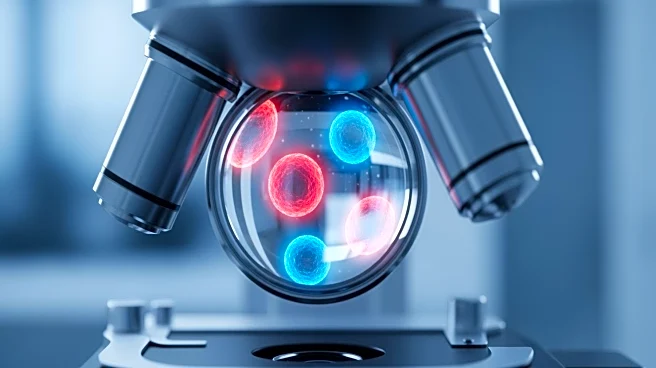What's Happening?
Researchers have developed CytoDiffusion, a generative AI tool that improves the accuracy of detecting abnormal blood cells, potentially transforming the diagnosis of conditions like leukemia. The system, created by teams from the University of Cambridge,
University College London, and Queen Mary University of London, uses generative AI to analyze blood cell shapes and structures. Unlike traditional AI models, CytoDiffusion can identify a wide range of normal and rare blood cell appearances, highlighting unusual cells that may indicate disease. The tool automates the analysis of blood smears, which contain thousands of cells, and triages routine cases while flagging unusual ones for human review. The AI's ability to detect abnormal cells linked to leukemia surpasses existing systems, and it can generate synthetic blood cell images indistinguishable from real ones.
Why It's Important?
The development of CytoDiffusion represents a significant advancement in medical diagnostics, particularly for blood disorders. By automating the analysis of blood smears, the tool reduces the workload on hematologists and increases diagnostic accuracy. This could lead to earlier detection and treatment of diseases like leukemia, improving patient outcomes. The AI's ability to quantify its own uncertainty also enhances clinical decision-making, providing a more reliable diagnostic tool. The release of the world's largest publicly available dataset of blood smear images further democratizes access to high-quality medical data, enabling researchers worldwide to develop new AI models and improve patient care.
What's Next?
Further work is needed to enhance the speed of CytoDiffusion and test its accuracy across diverse patient populations to ensure fairness. Researchers aim to expand the tool's applications beyond leukemia to other blood disorders, potentially revolutionizing hematology diagnostics. The release of the large dataset will likely spur innovation in AI-driven medical diagnostics, with researchers developing new models to improve accuracy and reliability. The integration of CytoDiffusion into clinical practice could lead to widespread adoption of AI tools in healthcare, transforming diagnostic processes and patient management.
Beyond the Headlines
The ethical implications of AI in healthcare are significant, as the technology could reduce human error and improve diagnostic accuracy. However, it also raises questions about the role of human expertise in medical decision-making. The ability of AI to quantify uncertainty may challenge traditional clinical practices, prompting a reevaluation of how diagnoses are made. The use of synthetic blood cell images for training AI models highlights the potential for AI to simulate complex biological processes, offering new avenues for research and development in medical science.

















